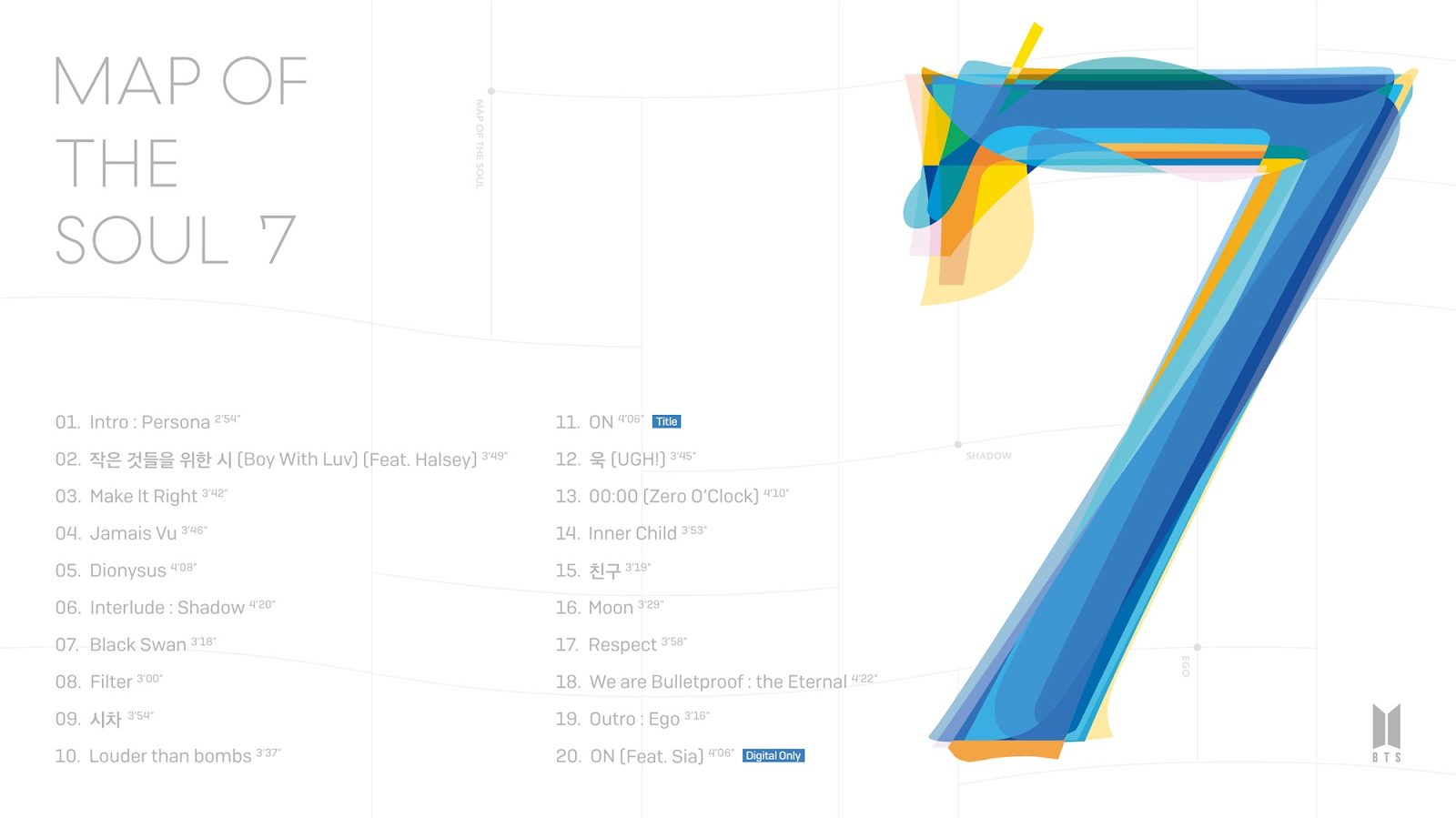On February 21, 2020, BTS released the long-awaited debut of their most recent album, Map of the Soul: 7. Not long after, on March 1, this album became their fourth to make the number one spot on the Billboard Charts, coming as no surprise to their many fans. However, there are also those who look at the sheer amount of BTS’ recurrences on the iTunes Top 100 charts in confusion. Who are these people, where did they come from, and why is their music so popular? This article will hopefully answer some of those questions as we recount the success of their latest album.
For a quick summary of the band, “BTS” stands for Bangtan Sonyeondan, which translates roughly to “Bulletproof Boy Scouts.” It is made up of seven South Korean producers, rappers, singers, and dancers under the label Big Hit Entertainment. They started out in 2013 talking about heavy themes (such as the lack of dreams and uncertainty in teens and young adults, as well as the flaws in the education system) through hip-hop and rap music, a huge breakaway from the peppiness and patterns that mainstream Korean pop leans toward. With only a small following numbering in the hundreds, dubbed “A.R.M.Y.,” BTS had to overcome serious financial struggles and fierce competition in the industry before their first breakthrough with I Need U in 2015. Late 2017 marked their US debut at the American Music Awards, where the multi-talented artists found themselves a new platform, as most Americans had never seen such an organized boy band. Since then, they’ve amassed fans, awards, and credibility alike, while spreading a message of self-reflection and self-love.
With a total of twenty tracks, 7 is the second of BTS’ Map of the Soul series that began in 2019 with the album Map of the Soul: Persona. The new album features full group songs, solo tracks, duets between members, separate rap and vocal-focused songs. It even features hit singers like Sia in a remix of their title track and Halsey in the re-issue of another. A known LGBTQ artist, Troye Sivan, helped write one of the tracks as well. Amazingly, at least one member has had a hand in every single song on the tracklist apart from vocals, through writing, producing, or penning lyrics in an attempt to show their passion for their career as well as deliver their sincere thanks to the fanbase that has helped them come so far.
The variety of the genres, from ballads to hip hop to contemporary to traditional East Asian riffs, have a stunningly wide range. At first glance to non-Korean speakers, the interesting conversational tone in rap track “Respect” by members RM and Suga or Jungkook’s high falsetto in the title track, “ON,” might catch your eye (or ears?). Just from looking at the tracklist, we can see that titles like “Intro: Persona,” “Interlude: Shadow,” and “Outro: Ego” are obviously allusions to Carl Jung’s 20th century work on psychology. However, only once you dig into the true meanings of the lyrics does everything begin to click.
Map of the Soul: 7 is a celebratory work, a throwback to the early days, and a checkpoint all at once. June 13, 2020 will mark the seventh year of the septet’s active career. The eighteenth track, “We Are Bulletproof: the Eternal,” serves as a power ballad/thank you letter as well as part three of the long-untouched, hardcore hip hop collection, We Are Bulletproof. From seven boys dreaming of a “big house, big cars and big rings” in their debut title “No More Dream,” BTS’ members are now seven millionaires.
However, fame has its consequences. BTS now explores the fear of losing their passion for music in “Black Swan,” the emptiness that fame has brought in “Interlude: Shadow,” and how being a performer from age thirteen has left the youngest with an incomplete childhood in “My Time.” The baring of an artist’s emotions to their supporters is rarely seen to this degree in Western music; a song like “Friends,” which describes the platonic relationship of two of the members as soulmates rather than following the regular structure of a love song, is hard to come by.
An album made for both the members as well as the fans, the emotional lyrics struck the hearts of many. In many ways, this album feels like a bittersweet ending or goodbye. As BTS thanks their fans in this achingly honest way and continues to pour their hearts out, it’s quite difficult not to conclude that this is the end of a unified BTS for the near future due the enlistment quota for South Korean men. Fans will surely still continue to cheer for BTS and hope for their continued comebacks in the future. For the time being, BTS will continue to promote Map of the Soul: 7 for all their fans to enjoy, out on all platforms now.

